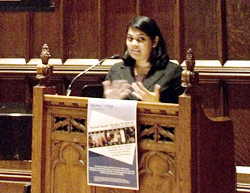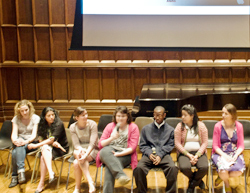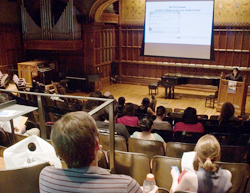Lights, Issues, Action, all in 3 Mins.
Short and pithy is the name of the game at TC's first Social Issue Media Festival
“The assumption that seeing is believing makes us susceptible to visual deceptions.” That was the message flashed at the beginning of “Sticker Shock,” a three-minute film by Francesca Socolick, a student in TC’s Communication, Computing and Technology Program. It was followed by a brief sequence in which a group of six women, wearing stickers covering different parts of their faces, closed their eyes and separated, without speaking, into different configurations. The film closed with the injunction: “Don’t assume or exclude, you might be missing out on some great and different friends.”
Socolick’s film was shown at TC’s first annual Social Issue Media Festival, organized by Lalitha Vasudevan, Assistant Professor of Technology and Education, and students Ahram Park Columbia University
“I had this idea, in teaching my course, that wouldn’t it be interesting if students weren’t just writing papers but engaging with the issues,” Vasudevan, who in her own research explores the “literacies” that adolescents create through different informal technologies, told the Milbank audience.
A jury that included TC faculty members John Broughton, Michelle Hill and Olga Hubbard, as well as Assistant Dean Kristine Roome, selected 10 entries showing at the Milbank event. Among them were “Reusable,” by Eric Carson, which informed viewers that at a single Starbucks, customers discard some 900 cups in the course of a day, and urged the use of reusable mugs; “Books Through Bars,” by Melanie Hibbert, about an organization that responds to requests by inmates in the U.S. prison system for books (the English dictionary is the single most requested text); and “Great Expectations,” by Deborah Wraight, about the clash between roles and dreams for modern women, who are expected to work, be mothers and “look gorgeous” all at the same time.
“You’re kind of like a duck—calm on top of the water, but paddling like hell underneath, and it stresses you out after a while,” the narrator intones. As the film ends text on the screen then asks, “So, will women ever have their happy ending?”
Published Tuesday, Jun. 29, 2010


